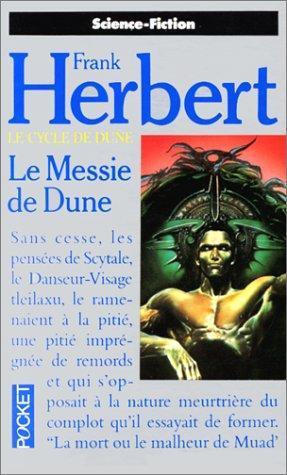mehluv@books.theunseen.city reviewed Dune Messiah by Frank Herbert (Dune, #2)
We Dune What We Have Two
5 stars
V satisfied with this book as a sequel.

mass market paperback, 315 pages
French language
Published Jan. 5, 1980 by Pocket.
Dune Messiah is a science fiction novel by American writer Frank Herbert, the second in his Dune series of six novels. A sequel to Dune (1965), it was originally serialized in Galaxy magazine in 1969, and then published by Putnam the same year. Dune Messiah and its own sequel Children of Dune (1976) were collectively adapted by the Sci-Fi Channel in 2003 into a miniseries entitled Frank Herbert's Children of Dune.
Dune Messiah is a science fiction novel by American writer Frank Herbert, the second in his Dune series of six novels. A sequel to Dune (1965), it was originally serialized in Galaxy magazine in 1969, and then published by Putnam the same year. Dune Messiah and its own sequel Children of Dune (1976) were collectively adapted by the Sci-Fi Channel in 2003 into a miniseries entitled Frank Herbert's Children of Dune.
V satisfied with this book as a sequel.
I don’t know how but this book was so impactful to me, probably more than the original
“Oof”, that was all I could think of on finishing this. Having failed to muster the interest to do this 35 years or so ago, I have, post-movie, finally caved to the fan recommendations that one “must simply” read this and the next two, at the very least.
What shall I say? 35 years ago me was right on gut judgment and the assessment of entertainment value. Herbert might have intended the Dune cycle to be a meditation on power and Messianic figures from the start, or he might simply have known a good thing when he saw it and milked the success of the first book, but there is a reason why Dune the book is an absolute classic, and Dune the series is for fanpeople* only. The writing is good and moody, but the whole thing is strung out far beyond what the flimsy structure …
“Oof”, that was all I could think of on finishing this. Having failed to muster the interest to do this 35 years or so ago, I have, post-movie, finally caved to the fan recommendations that one “must simply” read this and the next two, at the very least.
What shall I say? 35 years ago me was right on gut judgment and the assessment of entertainment value. Herbert might have intended the Dune cycle to be a meditation on power and Messianic figures from the start, or he might simply have known a good thing when he saw it and milked the success of the first book, but there is a reason why Dune the book is an absolute classic, and Dune the series is for fanpeople* only. The writing is good and moody, but the whole thing is strung out far beyond what the flimsy structure is able to carry, a novella forcibly, and painfully, stretched to full novel length. It feels “like butter scraped over too much bread”, to quote an author who knew how to really make things last.
Which begs the question: what am I going to do with the next two novels, which I bought cheap and blind? Do bits rot if they are never read?
Definitely a good follow-up to Dune. I appreciate that Usul remained a Fremen and hope to see him in Children of Dune.
Si dune raconte comment Paul Atreides réussit à transformer le piège Harkonnen en lieu de pouvoir, ce roman nous montre comment le même personnage essaye de ne pas apparaître uniquement comme un tyran en esquivant cette fois le piège du jihad. J'ai trouvé le roman plus faible, sans doute parce qu'il perd en unité. En effet, il y a plusieurs axes qui traversent le roman (le complot, les visions, la vie de famille), tous égaux en importance, et donc ne permettant pas de construire une progression claire du récit. De ce fait, la scène clé de l'aveuglement de Paul qui en fait un authentique voyant tombe un peu comme un cheveu sur la soupe. De la même manière, les aphorismes et autres citations qui tentent de pousser l'oeuvre plus haut tombent souvent à plat, alors que dans Dune ces citations de tête de chapitre apportaient souvent quelque chose.
Autrement dit, …
Si dune raconte comment Paul Atreides réussit à transformer le piège Harkonnen en lieu de pouvoir, ce roman nous montre comment le même personnage essaye de ne pas apparaître uniquement comme un tyran en esquivant cette fois le piège du jihad. J'ai trouvé le roman plus faible, sans doute parce qu'il perd en unité. En effet, il y a plusieurs axes qui traversent le roman (le complot, les visions, la vie de famille), tous égaux en importance, et donc ne permettant pas de construire une progression claire du récit. De ce fait, la scène clé de l'aveuglement de Paul qui en fait un authentique voyant tombe un peu comme un cheveu sur la soupe. De la même manière, les aphorismes et autres citations qui tentent de pousser l'oeuvre plus haut tombent souvent à plat, alors que dans Dune ces citations de tête de chapitre apportaient souvent quelque chose.
Autrement dit, c'est une oeuvre inférieure. Malgré tout, à la relecture, la compréhension du fait que Paul est un tyran plus meurtrier que Hitler ou Genghis Khan m'a paru franchement terrifiante.
Donc, si vous pensez que vous devez lire chaque tome de Dune, lisez ce roman. Sinon, je pense que c'est vraiment moins bien.
